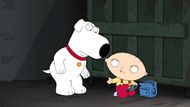Seth MacFarlane created the animated powerhouse, Family Guy, back in 1999, and you would bet people either loved every bit of it or acted like it was single-handedly ruining television. One minute you’re snort-laughing, the next you’re wondering if you are a bad person.
Based in a fictional town of Quahog, Rhode Island, the show sets the stage for the Griffin crew: Peter (the lovable idiot), Lois (way too patient, honestly), Chris (awkward incarnate), Meg (punching bag of the universe), Stewie (baby evil genius with a football head), and Brian (the dog who’s way too human).
Family Guy got fame for its cutaway gags: blink, and suddenly you’re in some weird flashback. The show is the king of sarcasm and poking fun at what you’re “not supposed” to joke about. Sometimes, it lands. Sometimes, you just sit there, jaw on the floor, wondering if they really went there (they did).
Fans have grown to expect this sort of chaos from it, but now and then, Family Guy will do something so nuts, so over-the-top, you think that they’ve finally lost it. Whether it’s Stewie building some murder machine, Peter getting into a fistfight with a giant chicken (don’t ask), or some joke that makes you question humanity, the show just keeps rolling. Even if you think you’ve seen it all… turns out you haven’t.
Critics have debated whether the more outrageous instances of the show have a specific satirical purpose or if they merely gleefully indulge in shock for its own sake. Scholarly critique indicates that the blend of direct and indirect satire enables Family Guy to comment upon everything from American family values to commercial media conventions, frequently targeting the Griffin family itself as the chief subject matter.
It is this very volatile touch that has made Family Guy relevant and disturbing over over two decades. The show revels in pulling the rug from under viewers’ expectations, as storylines zig and zag into something that veers from breathless violence to surreal humor, bordering occasionally on the topic of controversy and outrage. Thanks to this, Family Guy has given us some of the most jaw-dropping moments ever seen on animated TV.
Here, we explore the most surprising Family Guy moments you didn’t anticipate, and why they are significant in the show’s history.
Family Guy’s most brutal betrayals and heartbreaking goodbyes

Nobody was ready for Brian’s death in Family Guy Season 12 episode Life of Brian. As you are watching, Brian suddenly gets hit by a car. That dog had been the voice of reason, the only one keeping Peter’s nonsense in check. And now, he is gone, and the Griffin family is just standing there, wrecked.
The killing of Brian was kept very much under wraps and resulted in an en masse outpouring of sorrow from fans, petitions for Brian to be reinstated, and arguments within mainstream media about whether or not the show had crossed the line.
The story’s twist of replacing Brian with a new dog, Vinny, lasted only a few episodes when the writers brought Brian back through time travel, citing upset fans and the show’s reliance on Brian’s character. This surprise plot point is used as a benchmark for what fans and critics now expect from Family Guy: unpredictability, risk, and a subtextual desire to violate audience trust for the purposes of a joke or narrative device.
The darkest Family Guy episodes ever: Controversial plots and Brenda Q abuse

Family Guy episodes just go off the rails, and sometimes not in a funny way. Screams of Silence: The Story of Brenda Q is the one everyone points to when they talk about the show getting way too dark. It’s not just a little messed up; it goes into the deep end of domestic abuse, and not with any real sensitivity.
So, Quagmire’s sister Brenda gets stuck with an abusive boyfriend, Jeff. The episode features a scene of him beating her down, physically and emotionally. It feels like the show forgot it was supposed to be a cartoon. The episode appalled critics who said that its tone was too grim for an animated sitcom and that it treated abuse in a way that was exploitative rather than insightful.
Media folks and feminist groups called out the episode for being way too graphic and just tone-deaf. In fact, fans rage-quit the show after this. It’s wild how Family Guy can be all fart jokes one minute, then suddenly hit you with something so bleak it makes you reconsider everything.
Shocking Family Guy cutaways: The darkest and most disturbing humor moments

One of Family Guy’s DNA is the frequent appearance of cutaway gags: short, mini-scenes that chop into the main narrative to provide a quick joke. Occasionally, those gags veer so dark and off-color that they overpower the episode itself.
The most notorious of them could be the Prom Night Dumpster Baby joke, a bizarre scene in which something outrageous is made out of a truly tragic topic. This joke caused immediate controversy and is referenced by TV writers as one of the show’s most jarring moments, prompting arguments about whether the quest for shock comedy has boundaries.
Other unexpected cutaway gags include Brian’s accidental transmission of herpes to Stewie in Herpe the Love Sore. It is not exactly the sort of fare for ordinary sitcom conversation. In a misguided attempt to recreate a “blood brothers” ceremony, Stewie is appalled to realize he is now infected for life, a twist that left many viewers shocked and thoroughly disturbed.
Critics noted that this plot, like so many of the show’s most surprising moments, was as much about emphasizing Brian’s shortcomings as it was about making the audience squirm.
The evolution of Family Guy characters: Surprising deeds and aggressive Peter Griffin moments

If you look at Family Guy over the years, the characters have changed. Like, Peter Griffin started as this clueless oaf, but now he is just crazy: louder, meaner, and way more unpredictable. Half the time, he is wrecking his family for a cheap laugh. And the way he treats Meg used to be awkward dad stuff, but lately, it’s just full-blown bullying. There are episodes where you wonder if the writers just hate her.
Meg’s whole deal is wild, too. She used to be this generic, kind of invisible teenager, and now she is everyone’s favorite punching bag. Sometimes it is funny, but other times, it just feels mean for no reason.
There are scenes where Peter just smashes her, verbally or even physically, and you’re left wondering whether we’re supposed to laugh at this. The show tries to play it off as edgy satire, but it often just crosses over into straight-up cruelty. Critics have called this out, pointing out that sometimes it stops being clever and instead just looks like the writers are being mean.
Family Guy surprise plot turns: DNA pregnancy, grim violence, and banned episodes

Few contemporary TV comedies can compare to Family Guy for surreal, jaw-dropping plot turns. In one brain-twisting episode, Stewie artificially impregnates himself with Brian’s DNA in a bid to strengthen their friendship.
The result: a grotesque parody of childbirth and parenthood. This scene, among many others, underscores the extent to which the show is breaking rules to undertake even the most bizarre notions at the heart of its character.
One such episode, Road to the North Pole, stars Stewie and Brian filling in for Santa Claus, ending in a scene where Stewie murders someone and confines a child in a so-violent and so-surprising scene that it generated widespread media debate. It was named by critics and viewers as one of the darkest moments in series history.
Not every jaw-dropper is some master plan; sometimes, life just throws curveballs at the worst possible moment. Take the Turban Cowboy episode: they threw in this joke about the Boston Marathon, and literally weeks later, the real bombing happened. That episode got pulled from syndication in a bunch of places, obviously.
Stuff like this keeps Family Guy in the headlines, whether they’re trying to stir the pot or just tripping over accidental timing. That shock factor is sometimes not even on purpose.
Family Guy controversies: Satirical commentary that pushed social boundaries

Family Guy’s controversial history is inextricably linked to its status as a satirical work dedicated to pushing boundaries and defying social expectations. The series has consistently incited outrage, lawsuits, and activist campaigns for its disrespect toward a wide range of groups.
From the song I Need a Jew, which parodied Disney songs in a way that led to accusations of anti-Semitism, to the show’s provocative portrayal of real people like Terri Schiavo, it has shown that it is willing to engage in controversy, as long as it is for satire.
Family Guy stands out among its animated counterparts for its willingness to attack not only celebrities and general social issues, but its own lead characters, frequently using them as stand-ins for larger societal criticisms. By doing so, the show maintains an ability to surprise, sometimes at the expense of its characters and, in some cases, its viewers.
